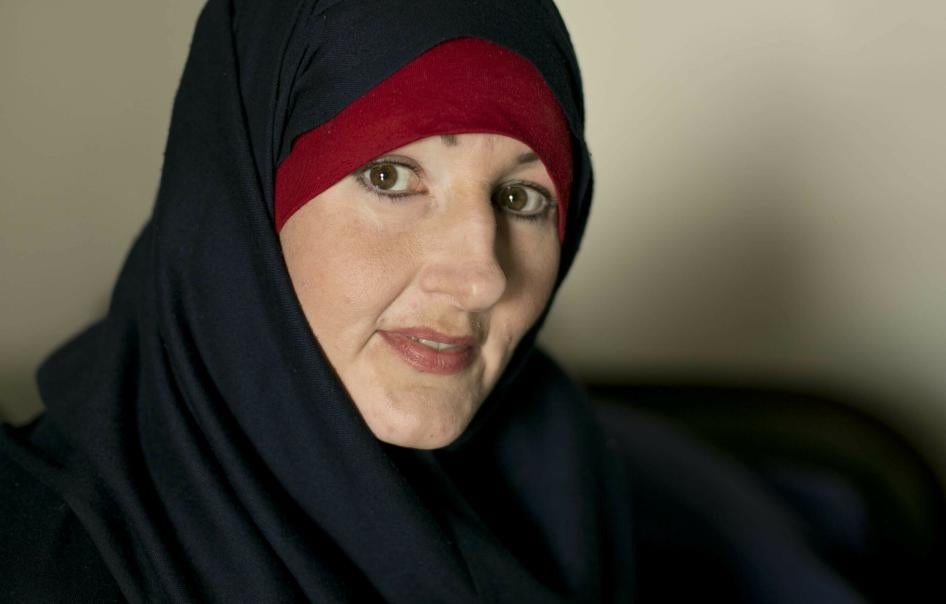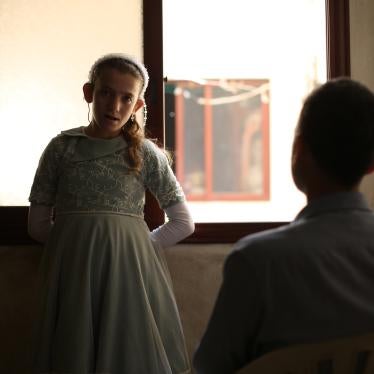Canada is effectively preventing a Canadian woman and a young Canadian child detained in northeast Syria from coming home for life-saving medical care despite a Canadian policy allowing them to do so, Human Rights Watch said today. That policy allows Canada to repatriate nationals held in northeast Syria as Islamic State (ISIS) suspects and family members if they have potentially fatal medical conditions that cannot be treated in the camps and prisons where they are held.
A former US ambassador who has taken several foreigners out of northeast Syria on behalf of their home countries told Human Rights Watch that in days of exchanges ending on February 15, 2022, Canadian authorities refused his offer to escort the woman and child to a Canadian consulate in neighboring Iraq. The families of the two Canadians, who are not related, have repeatedly implored government authorities to repatriate the woman and child and have sent them medical records attesting to their need for life-saving care.
“How close to death do Canadians have to be for their government to decide they qualify for repatriation?” said Letta Tayler, associate crisis and conflict director at Human Rights Watch. “Canada should be helping its citizens unlawfully held in northeast Syria, not obstructing their ability to get life-saving health care.”
The two detainees are among an estimated four dozen Canadians who have been held for three or more years as ISIS suspects and family members in life-threatening, deeply degrading, and often inhumane conditions in northeast Syria. None have been brought before a judicial authority to determine the necessity and legality of their detention, as required under international law. More than half of the Canadians are children, most under age 7.
The Kurdish-led authorities in northeast Syria detaining the Canadians and other foreigners have repeatedly urged home countries to repatriate their nationals. Canada has only allowed three of the detained nationals to come home, a 5-year-old orphaned girl in 2020, a 4-year-old girl in March 2021 and, eight months later, the second girl’s mother, whom it only provided emergency travel documents after a lawyer took the case to court. Canada has said that repatriating its nationals could pose a security risk and that it is too dangerous for its diplomats to travel inside war-torn northeast Syria to extract them.
However, the government has said that if Canadians reach a consulate, it will assist them, including if they request repatriation. In addition, Global Affairs Canada, the foreign ministry, adopted a policy framework in January 2021 that allows Canada to “consider” repatriations of its nationals held in northeast Syria on a case-by-case basis under certain conditions. The government never publicly announced the policy framework, called the “Government of Canada Policy Framework to Evaluate the Provision of Extraordinary Assistance: Consular Cases in North-Eastern Syria.” But it filed it in court papers in January 2022 in response to a case brought by the families of 26 Canadian detainees seeking to compel Canada to repatriate their relatives.
The conditions are highly restrictive but “could include” an “imminent, life-threatening medical condition, with no prospect of receiving medical treatment [on site],” says a copy of the policy framework reviewed by Human Rights Watch. A guiding principle of this policy was that “Canadian government officials must not be put in harm’s way.”
Peter Galbraith, the former US ambassador, told Human Rights Watch that while he was in northeast Syria in mid-February, he notified Global Affairs Canada that he was willing to bring out the two gravely ill Canadians, Kimberly Polman, 49, and a child who is younger than 12. That offer meant that no Canadian official would take the risk of entering northeast Syria. Human Rights Watch is withholding further details about the child, including their name and medical condition, to protect their privacy. In 2021, Galbraith had evacuated two of the three detained Canadians now back in Canada, the 4-year-old girl and her mother.
Galbraith said all he needed to proceed was for Global Affairs Canada to email a ranking official from the Kurdish-led authorities in northeast Syria stating that Canada would not object if he took Polman and the child across the border to Erbil, the capital of the Kurdistan Region of Iraq, where Canada has a consulate. The Kurdish-led authorities in northeast Syria have told Human Rights Watch and others that they will only release detained foreigners with the permission of their countries of nationality.
Global Affairs Canada turned Galbraith down. ““Canada's position appears to be this: It is too dangerous to send our diplomats into Syria to help Canadian citizens detained in Syria, but we will provide consular services to any Canadian who reaches a Canadian diplomatic mission,” Galbraith, who left northeast Syria after Canada rejected his offer, told Human Rights Watch. “However, Canada will also not make it possible for a Canadian detained in Syria to actually reach a Canadian diplomatic mission.”
On February 10, more than a dozen UN independent experts called on Canada to urgently repatriate Polman to treat life-threatening illnesses including hepatitis, kidney disease, and an autoimmune disorder. The experts said conditions in the locked camps holding Canadians and other foreigners met the threshold of torture and cruel, inhuman, and degrading treatment.
Global Affairs officials acknowledged in court papers that Polman was eligible to be considered for repatriation because of her medical condition, Lawrence Greenspon, the lawyer for most of the Canadians involved in the lawsuit, told Human Rights Watch. Assisted by Polman’s relatives, the Canadian organization Families Against Violent Extremism had a team of Canadian medics on the ground in the Kurdistan Region of Iraq the week of February 14 to evaluate Polman if Galbraith succeeded in getting her across the border, the group’s founder, Alexandra Bain, told Human Rights Watch.
Global Affairs Canada did not respond to Human Rights Watch’s request for comment.
Polman’s sister said she was devastated by her government’s intransigence. “It is heartbreaking for me,” she told Human Rights Watch. “Not only as her sister, but as a Canadian.”
The Canadians are among more than 40,000 foreigners from nearly 60 countries indefinitely detained, with no due process, in camps and prisons in northeast Syria for ISIS suspects and family members. Most are women and children. Hundreds of detainees have died of preventable illness, accidents, or violence between detainees or detainees and guards.
In January, ISIS assaulted a prison in the city of al-Hasakeh holding about 4,000 male detainees, including 700 boys, sparking a 10-day battle that according to local authorities left hundreds of detainees and scores of regional fighters dead, and many detainees unaccounted for. At least three Canadians were held in that prison, sources including a detainee and Bain told Human Rights Watch.
In its policy framework, Global Affairs carved out a loophole, saying that to be considered for repatriation, a detainee’s “situation” needs to have changed significantly since the policy took effect in January 2021. Polman’s and the child’s medical conditions predate the policy. However, the policy does not state what “situation” needs to have changed. Conditions in the camps and prisons including threats to life have deteriorated significantly since January 2021.
Canada has an obligation under international law to take necessary and reasonable steps to assist nationals abroad facing serious abuses including risks to life, torture, and inhuman and degrading treatment. International law also grants everyone the right to return to their country of nationality, without their government throwing up direct or indirect barriers.
Canada and other countries should take urgent action to safely repatriate all their citizens from northeast Syria, starting with those who are most vulnerable. They should make clear, publicly, that all their citizens who are arbitrarily detained should be immediately released to safety. Once home or resettled in safe third countries, former detainees can be offered rehabilitation and reintegration, and adults can be prosecuted if warranted.
“Canada has no conceivable reason for obstructing help to its citizens, yet it won’t even send an email that could save their lives,” Tayler said. “If this Canadian woman and child die in locked camps and prisons in northeast Syria, Canada would share the blame.”








